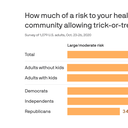Ipsos poll: COVID trick-or-treat

Published Date: 10/31/2020
Source: axios.com
Data: Axios/Ipsos poll; Note ±3.3% margin of error for the total sample size; Chart: Andrew Witherspoon/Axios
About half of Americans are worried that trick-or-treating will spread coronavirus in their communities, according to this week's installment of the Axios/Ipsos Coronavirus Index.Why it matters: This may seem like more evidence that the pandemic is curbing our nation's cherished pastimes. But a closer look reveals something more nuanced about Americans' increased acceptance for risk around activities in which they want to participate.By the numbers: Parents of trick-or-treat-aged children are actually less worried that trick-or-treating poses a large or moderate risk to their community (45%) than adults overall (58%).“Parents, that’s a risk they’re willing to run because of the importance of Halloween,” said Cliff Young, president of Ipsos U.S. Public Affairs."Acceptance doesn’t mean you’ve overcome a problem," but “we’re at acceptance level. People have learned to mitigate the risk and live with the virus. This is our new reality.”Be smart: The implications go beyond duct-taping a homemade candy chute to your stair railing to dispense Reese's Pieces this year, or putting a surgical mask over a Wonder Woman mask for added safety.It extends to U.S. voters who intend to load up on PPE and wait in line to cast their ballots in person.It extends to Americans experimenting with how to safely reunite with family and friends.Out latest polling suggests there's less concern about spread from Halloween, which is primarily celebrated outdoors, than with the coming winter holidays that typically involve large indoor family gatherings. Between the lines: As with virtually every other measure of pandemic fears, Halloween has a partisan divide: 75% of Democrats, 52% of independents and 34% of Republicans say it's risky this year.Methodology: This Axios/Ipsos Poll was conducted Oct. 23-26, 2020, by Ipsos’ KnowledgePanel®. This poll is based on a nationally representative probability sample of 1,079 general population adults age 18 or older.The margin of sampling error for the full sample is +/- 3.3 percentage points.